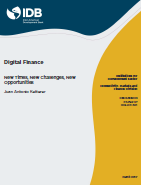Digital Finance: New Times, New Challenges, New Opportunities
Date
Mar 2017
Since the end of the great crisis of 2007-10, the financial services industry began a process of accelerating change. New business models based on convergent technological developments are challenging the status quo of a long-established and traditional industry. The purpose of this document is to consider the latest developments in the financial services industry and to discuss how they might affect the ability for firms--particularly small- and medium-sized enterprises (SMEs)--and individuals to access financing. It concludes that the transformative developments in the financial services industry will most likely improve and expand access of firms and individuals to finance, as well as increase formalization and financial inclusion. Some hurdles and risks that may hamper and/or delay the process are identified: the reaction of the industry incumbents, the lack of appropriate and timely regulation, the lack of access to good-quality and affordable digital connectivity (broadband access), and the unforeseen and seriously disruptive changes that might come from the payments space. To confront these risks, the public sector must define a set of proper and timely responses. The strategy for public interventions must be defined based on a deep understanding of the forces that are driving the change.




